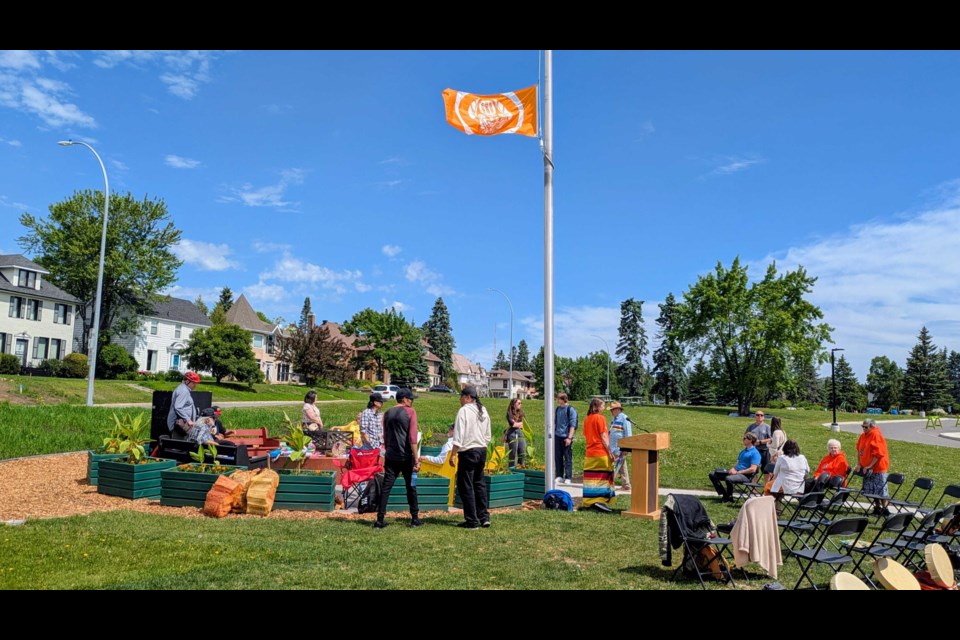THUNDER BAY – In a first for the city, June 30 — the day before Canada Day — was declared Indigenous Survivors Day.
Thunder Bay held a flag raising ceremony at City Hall and a sacred fire ceremony at Hillcrest Park.
Tanis Thompson, the city’s manager of Indigenous relations, told Newswatch that Thunder Bay isn’t the only city across Canada to make June 30 Indigenous Survivors Day, but she is proud to join the movement.
“It's about formally acknowledging the lived experiences of survivors and the colonial oppression, systemic oppression that has happened not only historically but presently right now here today, even with our children who are in foster care right now," Thompson said. "It's a very significant day when we look back and reflect to see how far we've come and the voices that are starting to be heard and embracing the truth of the pain of the shared history of Canada.”
Having Indigenous Survivors Day allows for more time to reflect, particularly on the eve of Canada Day, said Michele Solomon, chief of Fort William First Nation at the flag raising ceremony.
“This is a day that brings about a lot of ambiguity for people. Many of us, Indigenous, First Nation, Metis, and Inuit people have pride in our hearts about the country that we live in, but you have to understand the ambiguity that is rolled up in all of that.
"How do we celebrate a country that has caused so many harms, so much turmoil, so much intergenerational trauma?” Solomon said.
“At the same time, how do we reckon with the pride that we feel? It is so important that people understand the reckoning that happens within each of us every day as we face the realities of the history that we have all experienced.”
She also said that in many ways, National Truth and Reconciliation on Sept. 30 is different from Indigenous Survivors Day, where Sept. 30 acknowledges “the historic wrongs that have happened through residential schools,” and June 30 recognizes the “resiliency of having experienced the trauma that they have through the multiple systems.”
“Survivor's Day is important. I think this Survivor's Day is a really great opportunity to start bridging the gap between Canada Day and survivors and for people to understand better about why there is this challenge and critique, and reckoning that happens with Canada Day for First Nation, Inuit, and Métis people,” Solomon said.
“The significance of our histories and yes, our people want to acknowledge and celebrate too, but it's really important that that celebration is also understood with the truth of what has really happened in our collective histories.”
During the sacred fire ceremony, Thompson told the story of Troy Abromaitis, a member of Lytton First Nation, part of the Nlaka'pamux Nation, in British Columbia.
He campaigned for the federal government to declare June 30 a national day of recognition.
In a letter he asked Thompson to read aloud, he said three generations of his family carry “a distinct story of harm, each shaped by Canada's system of assimilation.”
Abromaitis' grandfather is a residential school survivor, his mother grew up in the foster care system, and he is a Sixties Scoop survivor.
“These experiences are not abstract. They are personal. They are the quiet heartbreaks and the loud silences that define our family, and yet through it all, we survived,” Abromaitis wrote.
“My advocacy is grounded in raising awareness not only for residential school survivors but also for those impacted by the Sixties Scoop, the Millennial Scoop, birth alerts, and the continued over-representation of Indigenous children in care. These are not isolated systems. They are a continuum of colonial harm, connected chapters of a broader history that must be acknowledged, understood, and addressed with honesty and care.”
“June 30th began as a dream that we would come together in a sacred ceremony to honour survivors in a good way to acknowledge not only our pain, but our strength. To remind the world that we are still here, that we have not only survived but are healing, rising, and rebuilding.”
